Portal:Socrates
Portal maintenance status: (December 2018)
|
Introduction
Socrates (/ˈsɒkrətiːz/; Ancient Greek: Σωκρᾰ́της, translit. Sōkrátēs, [sɔːkrátɛːs]; c. 470 – 399 BC) was a classical Greek (Athenian) philosopher credited as one of the founders of Western philosophy, and as being the first moral philosopher, of the Western ethical tradition of thought. An enigmatic figure, he made no writings, and is known chiefly through the accounts of classical writers writing after his lifetime, particularly his students Plato and Xenophon. Other sources include the contemporaneous Antisthenes, Aristippus, and Aeschines of Sphettos. Aristophanes, a playwright, is the only source to have written during his lifetime.
Plato's dialogues are among the most comprehensive accounts of Socrates to survive from antiquity, though it is unclear the degree to which Socrates himself is "hidden behind his 'best disciple'". Through his portrayal in Plato's dialogues, Socrates has become renowned for his contribution to the fields of ethics and epistemology. It is this Platonic Socrates who lends his name to the concepts of Socratic irony and the Socratic method, or elenchus.
Selected general articles
The Clouds (Ancient Greek: Νεφέλαι Nephelai) is a Greek comedy play written by the playwright Aristophanes. A lampooning of intellectual fashions in classical Athens, it was originally produced at the City Dionysia in 423 BC and was not as well received as the author had hoped, coming last of the three plays competing at the festival that year. It was revised between 420 and 417 BC and was thereafter circulated in manuscript form.
No copy of the original production survives, and scholarly analysis indicates that the revised version is an incomplete form of Old Comedy. This incompleteness, however, is not obvious in translations and modern performances. Read more...
Stoicism is a school of Hellenistic philosophy founded by Zeno of Citium in Athens in the early 3rd century BC. While Stoic physics are largely drawn from the teachings of the philosopher Heraclitus, they are heavily influenced by certain teachings of Socrates. Stoicism is predominantly a philosophy of personal ethics informed by its system of logic and its views on the natural world. According to its teachings, as social beings, the path to happiness for humans is found in accepting the moment as it presents itself, by not allowing oneself to be controlled by the desire for pleasure or fear of pain, by using one's mind to understand the world and to do one's part in nature's plan, and by working together and treating others fairly and justly.
The Stoics are especially known for teaching that "virtue is the only good" for human beings, and that external things—such as health, wealth, and pleasure—are not good or bad in themselves, but have value as "material for virtue to act upon". Alongside Aristotelian ethics, the Stoic tradition forms one of the major founding approaches to Western virtue ethics. The Stoics also held that certain destructive emotions resulted from errors of judgment, and they believed people should aim to maintain a will (called prohairesis) that is "in accord with nature". Because of this, the Stoics thought the best indication of an individual's philosophy was not what a person said, but how a person behaved. To live a good life, one had to understand the rules of the natural order since they thought everything was rooted in nature. Read more...- A gadfly is a person who interferes with the status quo of a society or community by posing novel, potently upsetting questions, usually directed at authorities. The term is originally associated with the ancient Greek philosopher Socrates, in his defense when on trial for his life. Read more...
Plato (/ˈpleɪtoʊ/;[a] Greek: Πλάτων[a] Plátōn, pronounced [plá.tɔːn] in Classical Attic; 428/427 or 424/423[b] – 348/347 BC) was a philosopher in Classical Greece and the founder of the Academy in Athens, the first institution of higher learning in the Western world. He is widely considered the pivotal figure in the development of Western philosophy, along with his teacher, Socrates, and his most famous student, Aristotle. In addition, Plato has also often been cited as one of the founders of Western religion and spirituality. Alfred North Whitehead once noted: "the safest general characterization of the European philosophical tradition is that it consists of a series of footnotes to Plato."
Plato was the innovator of the written dialogue and dialectic forms in philosophy. His most famous contribution bears his name, Platonism (also ambiguously called either Platonic realism or Platonic idealism), the doctrine of the Forms to provide a realist solution to the problem of universals. Plato also appears to have been the founder of Western political philosophy, with his Republic, and Laws among other dialogues, providing some of the earliest extant treatments. The so-called Neoplatonism of philosophers like Plotinus and Porphyry influenced Saint Augustine and thus Christianity. Read more...- Virtue ethics (or aretaic ethics /ˌærəˈteɪ.ɪk/, from Greek ἀρετή (arete)) are normative ethical theories which emphasize virtues of mind and character. Virtue ethicists discuss the nature and definition of virtues and other related problems. These include how virtues are acquired, how they are applied in various real life contexts, and whether they are rooted in a universal human nature or in a plurality of cultures. Read more...
The Cyrenaics or Kyrenaics (Ancient Greek: Κυρηναϊκοί; Kyrēnaïkoí) were a sensual hedonist Greek school of philosophy founded in the 4th century BCE, supposedly by Aristippus of Cyrene, although many of the principles of the school are believed to have been formalized by his grandson of the same name, Aristippus the Younger. The school was so called after Cyrene, the birthplace of Aristippus. It was one of the earliest Socratic schools. The Cyrenaics taught that the only intrinsic good is pleasure, which meant not just the absence of pain (as it did for Epicurus), but positively enjoyable sensations. Of these, momentary pleasures, especially physical ones, are stronger than those of anticipation or memory. They did, however, recognize the value of social obligation and that pleasure could be gained from altruistic behaviour. The school died out within a century and was replaced by the philosophy of Epicureanism. Read more...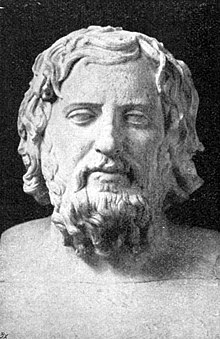 The Greek mercenary and historian Xenophon of Athens.
The Greek mercenary and historian Xenophon of Athens.
Xenophon of Athens (/ˈzɛnəfən,-ˌfɒn/; Greek: Ξενοφῶν, Ancient Greek: [ksenopʰɔ̂ːn], Xenophōn; c. 431– 354 BC) was an ancient Greek philosopher, historian, soldier, mercenary, and student of Socrates. As a soldier, Xenophon became commander of the Ten Thousand at about 30, with noted military historian Theodore Ayrault Dodge saying of him, “the centuries since have devised nothing to surpass the
genius of this warrior.” He established the precedent for many logistical operations and was among the first to use flanking maneuvers, feints and attacks in depth. He was among the greatest commanders of antiquity.
As a historian, Xenophon is known for recording the history of his time, the late-5th and early-4th centuries BC, in such works as the Hellenica, which covered the final seven years and the aftermath of the Peloponnesian War (431–404 BC), thus representing a thematic continuation of Thucydides' History of the Peloponnesian War.
As one of the Ten Thousand (Greek mercenaries), Xenophon participated in Cyrus the Younger's failed campaign to claim the Persian throne from his brother Artaxerxes II of Persia and recounted the events in Anabasis, his most notable history. Like Plato (427–347 BC), Xenophon is an authority on Socrates, about whom he wrote several books of dialogues (the Memorabilia) and an Apology of Socrates to the Jury, which recounts the philosopher's trial in 399 BC. Read more... Aristotle, by Francesco Hayez
Aristotle, by Francesco Hayez
Aristotelianism (/ˌærɪstəˈtiːliənɪzəm/ ARR-i-stə-TEE-lee-ə-niz-əm) is a tradition of philosophy that takes its defining inspiration from the work of Aristotle. This school of thought is in the modern sense of philosophy, covering existence, ethics, mind and related subjects. In Aristotle's time, philosophy included natural philosophy, which preceded the advent of modern science during the Scientific Revolution. The works of Aristotle were initially defended by the members of the Peripatetic school and later on by the Neoplatonists, who produced many commentaries on Aristotle's writings. In the Islamic Golden Age, Avicenna and Averroes translated the works of Aristotle into Arabic and under them, along with philosophers such as Al-Kindi and Al-Farabi, Aristotelianism became a major part of early Islamic philosophy.
Moses Maimonides adopted Aristotelianism from the Islamic scholars and based his famous Guide for the Perplexed on it and that became the basis of Jewish scholastic philosophy. Although some of Aristotle's logical works were known to western Europe, it was not until the Latin translations of the 12th century that the works of Aristotle and his Arabic commentators became widely available. Scholars such as Albertus Magnus and Thomas Aquinas interpreted and systematized Aristotle's works in accordance with Christian theology. Read more...
Antisthenes (/ænˈtɪsθɪniːz/; Greek: Ἀντισθένης; c. 445 – c. 365 BC) was a Greek philosopher and a pupil of Socrates. Antisthenes first learned rhetoric under Gorgias before becoming an ardent disciple of Socrates. He adopted and developed the ethical side of Socrates' teachings, advocating an ascetic life lived in accordance with virtue. Later writers regarded him as the founder of Cynic philosophy. Read more...- Socratic questioning (or Socratic maieutics) was named after Socrates, who was a philosopher in c. 470 BCE–c. 399 BCE. Socrates utilized an educational method that focused on discovering answers by asking questions from his students. Socrates believed that "the disciplined practice of thoughtful questioning enables the scholar/student to examine ideas and be able to determine the validity of those ideas" . Plato, a student of Socrates, described this rigorous method of teaching to explain that the teacher assumes an ignorant mindset in order to compel the student to assume the highest level of knowledge . Thus, a student has the ability to acknowledge contradictions, recreate inaccurate or unfinished ideas and critically determine necessary thought.
Socratic questioning is a form of disciplined questioning that can be used to pursue thought in many directions and for many purposes, including: to explore complex ideas, to get to the truth of things, to open up issues and problems, to uncover assumptions, to analyze concepts, to distinguish what we know from what we do not know, to follow out logical consequences of thought or to control discussions. Socratic questioning is based on the foundation that thinking has structured logic, and allows underlying thoughts to be questioned. The key to distinguishing Socratic questioning from questioning per se is that Socratic questioning is systematic, disciplined, deep and usually focuses on fundamental concepts, principles, theories, issues or problems. Read more...
The trial of Socrates (399 BC) was held to determine the philosopher’s guilt of two charges: asebeia (impiety) against the pantheon of Athens, and corruption of the youth of the city-state; the accusers cited two impious acts by Socrates: “failing to acknowledge the gods that the city acknowledges” and “introducing new deities”.
The death sentence of Socrates was the legal consequence of asking politico-philosophic questions of his students, from which resulted the two accusations of moral corruption and of impiety. At trial, the majority of the dikasts (male-citizen jurors chosen by lot) voted to convict him of the two charges; then, consistent with common legal practice, voted to determine his punishment, and agreed to a sentence of death to be executed by Socrates’s drinking a poisonous beverage of hemlock. Read more...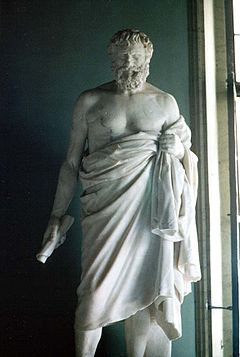 Statue of an unknown Cynic philosopher from the Capitoline Museums in Rome. This statue is a Roman-era copy of an earlier Greek statue from the third century BC. The scroll in his right hand is an 18th-century restoration.
Statue of an unknown Cynic philosopher from the Capitoline Museums in Rome. This statue is a Roman-era copy of an earlier Greek statue from the third century BC. The scroll in his right hand is an 18th-century restoration.
Cynicism (Greek: κυνισμός) is a school of thought of ancient Greek philosophy as practiced by the Cynics (Greek: Κυνικοί, Latin: Cynici). For the Cynics, the purpose of life is to live in virtue, in agreement with nature. As reasoning creatures, people can gain happiness by rigorous training and by living in a way which is natural for themselves, rejecting all conventional desires for wealth, power, sex, and fame. Instead, they were to lead a simple life free from all possessions.
The first philosopher to outline these themes was Antisthenes, who had been a pupil of Socrates in the late 5th century BC. He was followed by Diogenes, who lived in a pot on the streets of Athens. Diogenes took Cynicism to its logical extremes, and came to be seen as the archetypal Cynic philosopher. He was followed by Crates of Thebes, who gave away a large fortune so he could live a life of Cynic poverty in Athens. Cynicism spread with the rise of the Roman Empire in the 1st century, and Cynics could be found begging and preaching throughout the cities of the empire. Read more...- "The unexamined life is not worth living" (Ancient Greek: ὁ ... ἀνεξέταστος βίος οὐ βιωτὸς ἀνθρώπῳ) is a famous dictum apparently uttered by Socrates at his trial for impiety and corrupting youth, for which he was subsequently sentenced to death, as described in Plato's Apology (38a5–6). Read more...
- The Socratic problem (or Socratic question) is a term used in historical scholarship concerning attempts at reconstructing a historical and philosophical image of Socrates based on the variable, and sometimes contradictory, nature of the existing sources on his life. Scholars rely upon the extant sources such as those of contemporaries like Aristophanes or disciples of Socrates like Plato and Xenophon for knowing anything about Socrates. However, these sources contain contradictory details of his life, words, and beliefs when taken together. This complicates the attempts at reconstructing the beliefs and philosophical views held by the historical Socrates. It is apparent to scholarship that this problem is now deemed a task seeming impossible to clarify and thus perhaps now classified as unsolvable.
Socrates was the main character in most of Plato's dialogues and was a genuine historical figure. It is widely understood that in later dialogues Plato used the character Socrates to give voice to views that were his own. Besides Plato, three other important sources exist for the study of Socrates: Aristophanes, Aristotle, and Xenophon. Since no extensive writings of Socrates himself survive to the modern era, his actual views must be discerned from the sometimes contradictory reports of these four sources. The main sources for the historical Socrates are the Sokratikoi logoi, or Socratic dialogues, which are reports of conversations apparently involving Socrates. Most information is found in the works of Plato and Xenophon. Read more... - "I know that I know nothing" is a saying derived from Plato's account of the Greek philosopher Socrates. It is also called the Socratic paradox. The phrase is not one that Socrates himself is ever recorded as saying.
This saying is also connected or conflated with the answer to a question Socrates (according to Xenophon) or Chaerephon (according to Plato) is said to have posed to the Pythia, the oracle of Delphi, in which the Oracle stated something to the effect of "Socrates is the wisest." Read more... - Socratic irony is "the dissimulation of ignorance practised by Socrates as a means of confuting an adversary". Socrates would pretend to be ignorant of the topic under discussion, to draw out the inherent nonsense in the arguments of his interlocutors. The Chambers Dictionary defines it as "a means by which a questioner pretends to know less than a respondent, when actually he knows more".
Zoe Williams of The Guardian wrote: "The technique [of Socratic irony], demonstrated in the Platonic dialogues, was to pretend ignorance and, more sneakily, to feign credence in your opponent's power of thought, in order to tie him in knots." Read more... - The Socratic method, also known as maieutics, method of elenchus, elenctic method, or Socratic debate, is a form of cooperative argumentative dialogue between individuals, based on asking and answering questions to stimulate critical thinking and to draw out ideas and underlying presuppositions. It is a dialectical method, involving a discussion in which the defense of one point of view is questioned; one participant may lead another to contradict themselves in some way, thus weakening the defender's point. This method is named after the Classical Greek philosopher Socrates and is introduced by him in Plato's Theaetetus as midwifery (maieutics) because it is employed to bring out definitions implicit in the interlocutors' beliefs, or to help them further their understanding.
The Socratic method is a method of hypothesis elimination, in that better hypotheses are found by steadily identifying and eliminating those that lead to contradictions. The Socratic method searches for general, commonly held truths that shape beliefs and scrutinizes them to determine their consistency with other beliefs. The basic form is a series of questions formulated as tests of logic and fact intended to help a person or group discover their beliefs about some topic, exploring definitions or logoi (singular logos) and seeking to characterize general characteristics shared by various particular instances. Read more... - "I know that I know nothing" is a saying derived from Plato's account of the Greek philosopher Socrates. It is also called the Socratic paradox. The phrase is not one that Socrates himself is ever recorded as saying.
This saying is also connected or conflated with the answer to a question Socrates (according to Xenophon) or Chaerephon (according to Plato) is said to have posed to the Pythia, the oracle of Delphi, in which the Oracle stated something to the effect of "Socrates is the wisest." Read more... - Socratic dialogue (Ancient Greek: Σωκρατικὸς λόγος) is a genre of literary prose developed in Greece at the turn of the fourth century BC. It is preserved in the works of Plato and Xenophon. The discussion of moral and philosophical problems between two or more characters in a dialogue is an illustration of one version of the Socratic method. The dialogues are either dramatic or narrative and Socrates is often the main participant. Read more...
The Megarian school of philosophy, which flourished in the 4th century BC, was founded by Euclides of Megara, one of the pupils of Socrates. Its ethical teachings were derived from Socrates, recognizing a single good, which was apparently combined with the Eleatic doctrine of Unity. Some of Euclides' successors developed logic to such an extent that they became a separate school, known as the Dialectical school. Their work on modal logic, logical conditionals, and propositional logic played an important role in the development of logic in antiquity. Read more...
Aristippus of Cyrene (/ˌærəˈstɪpəs/; Greek: Ἀρίστιππος ὁ Κυρηναῖος; c. 435 – c. 356 BCE) was the founder of the Cyrenaic school of Philosophy. He was a pupil of Socrates, but adopted a very different philosophical outlook, teaching that the goal of life was to seek pleasure by circumstances to oneself and by maintaining proper control over both adversity and prosperity. His outlook came to be called "ethical hedonism." Among his pupils was his daughter Arete.
There are indications that he was conflated with his grandson, Aristippus the Younger. Read more...
Socrates (/ˈsɒkrətiːz/; Ancient Greek: Σωκρᾰ́της, translit. Sōkrátēs, [sɔːkrátɛːs]; c. 470 – 399 BC) was a classical Greek (Athenian) philosopher credited as one of the founders of Western philosophy, and as being the first moral philosopher, of the Western ethical tradition of thought.
An enigmatic figure, he made no writings, and is known chiefly through the accounts of classical writers writing after his lifetime, particularly his students Plato and Xenophon. Other sources include the contemporaneous Antisthenes, Aristippus, and Aeschines of Sphettos. Aristophanes, a playwright, is the only source to have written during his lifetime.
Plato's dialogues are among the most comprehensive accounts of Socrates to survive from antiquity, though it is unclear the degree to which Socrates himself is "hidden behind his 'best disciple'". Through his portrayal in Plato's dialogues, Socrates has become renowned for his contribution to the fields of ethics and epistemology. It is this Platonic Socrates who lends his name to the concepts of Socratic irony and the Socratic method, or elenchus. Read more...- Platonism, rendered as a proper noun, is the philosophy of Plato or the name of other philosophical systems considered closely derived from it. In narrower usage, platonism, rendered as a common noun, refers to the philosophy that affirms the existence of abstract objects, which are asserted to "exist" in a "third realm" distinct both from the sensible external world and from the internal world of consciousness, and is the opposite of nominalism. Lower case "platonists" need not accept any of the doctrines of Plato.
In a narrower sense, the term might indicate the doctrine of Platonic realism. The central concept of Platonism, a distinction essential to the Theory of Forms, is the distinction between the reality which is perceptible but unintelligible, and the reality which is imperceptible but intelligible. The forms are typically described in dialogues such as the Phaedo, Symposium and Republic as transcendent perfect archetypes of which objects in the everyday world are imperfect copies. Read more...
Need help?
Do you have a question about Socrates that you can't find the answer to?
Consider asking it at the Wikipedia reference desk.
Selected images
Bust of Socrates in the Vatican Museum
Depiction of Socrates by 13th century Seljuk illustrator
Statue of Socrates in front of the Academy of Athens (modern)
The Death of Socrates, by Jacques-Louis David (1787)
Socrates Tears Alcibiades from the Embrace of Sensual Pleasure by Jean-Baptiste Regnault (1791)
Socrates and Alcibiades, by Christoffer Wilhelm Eckersberg
Battle of Potidaea (432 BC): Athenians against Corinthians (detail). Scene of Socrates (center) saving Alcibiades. 18th century engraving.
Carnelian gem imprint representing Socrates, Rome, 1st century BC–1st century AD.
Statue of Socrates in the Irish National Botanic Gardens
Subcategories
- Select [►] to view subcategories
Associated Wikimedia
The following Wikimedia Foundation sister projects provide more on this subject:
Wikibooks
Books
Commons
Media
Wikinews
News
Wikiquote
Quotations
Wikisource
Texts
Wikiversity
Learning resources
Wiktionary
Definitions
Wikidata
Database
- What are portals?
- List of portals
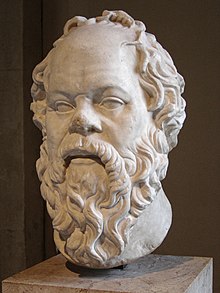


_-_BEIC_6353768.jpg/220px-Paolo_Monti_-_Servizio_fotografico_(Napoli%2C_1969)_-_BEIC_6353768.jpg)

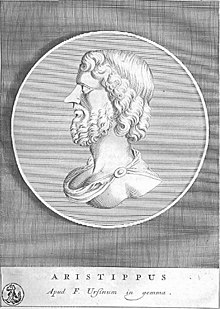
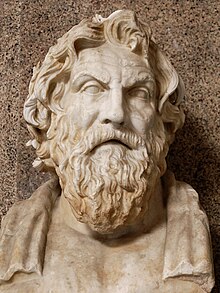










.jpg/120px-Battle_of_Potidaea_Socrates_saving_Alcibiades_(detail).jpg)

